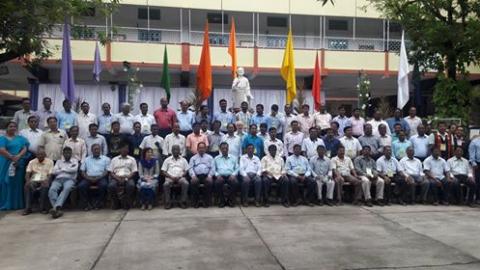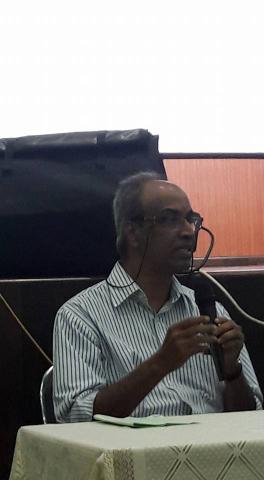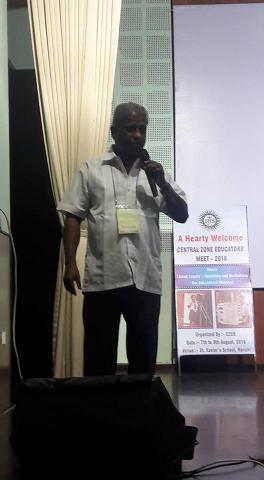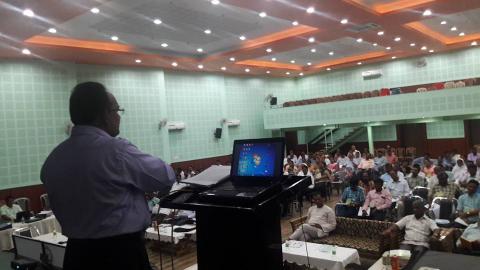



THEME: Jesuit Legacy: Revisiting and Revitalizing Our Educational Ministry
Organized by CZEB (Central Zone Education Bureau)
Venue: St. Xavier’s School, Doranda, Ranchi, Jharkhand
Central Zone Educators’ Meet 2016 began at 7.00 P.M. in the Auditorium of St. Xavier’s School, Doranda, Ranchi. Nearly 175 delegates from five Provinces of Central Zone were present for the Meet. The School Choir aptly welcomed the gathering with the song ‘Tum Mile’.
Thereafter Fr. Ajit Kr. Xess, S.J. on behalf of Central Zone Education Bureau, welcomed the dignitaries and requested Fr. Joseph Marianus Kujur S.J., the Provincial of Ranchi Jesuit Province to present a bouquet of flowers to, Fr. George Pattery S.J., the POSA, Fr. Francis Kurian S.J., the Provincial of Hazaribag, Fr. Sunny Jacob S.J., JEA Secretary and PCEs of all the central zone provinces .
Fr. Joseph Marianus Kujur, then, delivered a welcome address. Appreciating the contributions of Fr. Sunny to the CZEB and its Secretaries, Fr. Ajit Xess, and Fr. Florence Kujur, he highlighted the gloomy picture of education in our country, citing the Research conducted by Home Ministry of India. He called it a context for which the educators need to deliberate, reaching out to the NEEDY.
Exemplifying philosophies of Nelson Mandela, Napoleon Bonaparte and Pope Francis, he felt the need to enter into a process of Education for emancipation of Socio-Economic evils. He showed his concern for high rate of drop-out girl students, and the DISPARITIES in Indian education: namely, rural vs. urban schools, private vs. public schools, English medium vs. regional medium schools etc.
He mentioned the emerging New Trends like, Commercialization and Safronization, Legal issues, financial crunch and new upcoming Acts in education field hampering educational activities in schools. In such context, Jesuit Role in the transformation of the society is desired. The purpose of the Meet, therefore, is to: Support one another in our brokenness; updating ourselves; Renewal of our commitment, and Networking. This calls for visionary Principals.
Distinguishing between Mission and Institution, he aligned with Fr. General who keeps reminding that we are not here to keep our institutions but for the mission of the Society to transform the society and preserve human values. He concluded challenging the gathering that this exercise may not become only an exercise of logistics but a process to inner freedom, to be more effective in mission.
Thereafter Fr. Florence Kujur, S.J. explained the logistics of the gathering.
8th August 2016
The day began with the Holy Eucharist presided over by Fr. Joseph Marianus Kujur. In his sermon he called the gathering to rediscover the role of the Jesuit educators in the midst of progressive India in terms of Science and Technology. However, he also reminded of the Paradoxes hovering over:
- This progress in science and technology is only for a few fortunate;
- Paradox in terms of homogenization; inconsistency, inequality in education
- Paradox of unity and divisiveness and secularism and fundamentalism
- India has double Democracy one for the poor and the other for the rich.
He added that Education, Society and Culture are interlinked and education must play a vital role to uphold this harmonious interlink. Talking of the hegemonic change he mentioned ‘Pedagogy of the Oppressed’ of Paulo, which could work here. Hence, our role, he said, is to follow:
- The spirituality of a seeker: trusting in the Lord; continue to look for.
- The spirituality of holism/whole-ism: taking whole of the perspective (economic, personality, societal, etc) of the persons as context of our mission.
- The spirituality of emptying oneself, kenosis, in our mission.
He concluded quoting Pope Francis, “look at the Past with Gratitude; live the Present with Passion; envisage the Future with Hope.” Be an agent to bring people together with holistic well-being rather than dividing them.
Session 1: Key-Note Address, by Fr. George Pattery, S.J., the POSA
It started with the lighting of the lamp by Fr. George Patterey, Fr. Kurian, Fr. J. Marianus Kujur, Fr. Sunny Jacob and Fr. Ajit Xess followed by a short prayer. The session was chaired by Fr. Erentius Minj, S.J.
Expressing his happiness having been part of the meet Fr. George Pattery SJ, called it a Right Move in the Right Direction in the context of Restructuring of our Provinces. The following are his deliberations taking the theme: Jesuit Legacy in Education.
- The Jesuits were neither the first nor the only educators, and had no advanced technology, yet, with the Jesuit Pedagogy they reached the ends of the world. They invented an Inner Compass, a magnetic device, to lead and show the direction. This Navigating Device led them where they wanted to go. The Inner Compass became a discerning tool to connect with people. This inclusive compass helped the Jesuits to navigate the experiences of the world. This Jesuit Legacy is to be passed over to the new generation not by sitting on the top of having such Legacy, but with the same guidance of spiritual movement which helped the then Jesuits. This Legacy is available and accessible to all. This compass is similar to Spiritual Exercises.
After handing over the compass to our students and teachers we need to make it available to the whole world, the larger framework; our stories to the larger stories; our situation to the larger situation. 13.5 billion years is the age of the world and much of the age was without human beings. Therefore our context is smaller as compared to the larger context of creation.
- We are inter-connected and inter-dependent people. This inter-connectedness and inter-dependency has to be shown to the children, creating space for compassion. Jesuit education is a spiritual exercise practiced in the school not only in Jesuit community separately. Jesuit education must reach out to the woundedness of the world. Jesuit tool, the compass, will help us to do that.
Our perspective today is that of ‘illiteracy’, that is, inability to recognize brothers and sisters. Let us not create illiterate people through our education. The day begins when one begins to recognize one’s brothers and sisters next to one. Our education should not just capacitate our students with knowledge. Ours must capacitate them with Life. This kind of literacy is there available across the world, among the tribals and indigenous people. We have to enable those experiences of literacy that help navigate Life. Hence we need to change the Mindset which considers one right and others wrong. In today’s scenario our education must change the Mindset of the people, especially our students. It must be imparted to the students that God is Compassionate. This is how we prepare our student for an inclusive mindset.
- Let us pay heed to the Protocol on Child Protection and establish Grievance Redressal Cells in schools and make it known to the entire campus. We have 800 and more Jesuits in India involved in the education, of which 700 of them are engaged in the Administration. We Move from ADMINISTRATION to ANIMATION. To become animators, capacitating the students and teachers to animating spirit we bring the Jesuit compass to work in our campus and make it a joyful place.
He concluded saying, ‘Compassion is not out of our curriculum; separate from our mission. Compassion is a way of knowing.’
Question-answer session brought about some crucial issues of syllabus vs. Jesuit Legacy. It was admitted that there is the pressure of completion of syllabus, but syllabus is in our hands. What we require is the change of mindset. We cannot control the govt. Systems what we can control is what is in our hands. It was also said that the teaching-learning is very much a spiritual exercise.
Theme: CZEB: Strengthening our Network
Chairperson: Fr. Anthony Raj (JAM) Resource person: Fr. Francis Kurian
Fr. Francis Kurian, S.J., the Provincial of Hazaribag spoke on the theme – “CZEB: Strengthening our Network”. Placing the context he called for strengthening the Network among the Central Zone Jesuit individuals, institutions and Provinces, CZEB as nodal agency to facilitate it. The Central Zone has in its Education Ministry 360 Jesuits, 211 Religious Sisters collaborators, 4320 lay collaborators, 1,60,921 students (of formal schools), and that 36,703 of the students are Catholics. He went on to say that 17,961 of the students are in our hostels. ‘This is a huge commitment, an opportunity and a responsibility’, he said.
He further presented the current state of Education in India & Jharkhand, as
- Education seen merely as a passport to career;
- Teaching too seen largely as career, and not as ‘vocation’;
- Poor quality of teacher-education & teaching-learning methodology;
- Hence, passive students and active teachers (when present);
- Hence, rote learning, ‘keys’, tuitions, & cheating in exams;
- Very poor academic achievements by most students;
- Values & life-skills largely missing from today’s education;
He presented also some of the concerns of India Today & the World at large, such as, the poor being wiped out in Globalization, ‘Development’ of a few at the expense of large sections of vulnerable people, Unsustainable ‘growth’ at the expense of our fragile environment, divisiveness, intolerance, violence, terror, unprecedented pursuit for power, success, security etc.
He said that we have a major opportunity and a huge task to accomplish, but the question is whether we use available means available to respond to this opportunity and task and whether we strive for efficiency and effectiveness in our mission.
One of the main aims of the CZEB is “to promote greater understanding and collaboration among the Jesuits of the CZ involved in Education, particularly in sharing our resources, personnel, finances and expertise”. Further, he listed the responsible persons/offices for networking. They are:
- Provincials: Who are convinced of the importance of the task and are willing to share adequate resources and personnel. They delegate responsibilities and regularly monitor and support and encourage.
- PCEs: A full-timer with office and staff convinced of his job, prompt in communication with Provincials, CZEB, and schools, resourceful and mobile for firsthand experience.
- Heads of Schools & Jesuit staff: Familiar with the current scenario, have clarity of goals of education; good in communication, familiar with Jesuit Legacy; good at consultation, decision-making; good at delegation and collaboration at different levels and open to 360 degree feedback.
- Religious collaborators and staff: Competent, creative and conscientious; familiar with Jesuit Legacy and goals of education; Good at mentoring; Eager to update constantly; Convinced of student-centred, participatory learning.
- Central Zone Education Bureau: Nodal agency, a hub to facilitate communication among the Education Depts., JEA Secretary, PCEs and Heads of schools; Help schools to ease their problems with Education Depts. of Govt; Coordinate sharing of resources, expertise, and best practices among provinces and educational institutions; Maintain a website and E-newsletters for easy communication; Coordinate research into relevant areas of our Education Ministry; Coordinate the dissemination of Jesuit Education Legacy.
Fr. Kurian presented the Current Scenario saying that Ranchi Province has generously assigned 2 men to the CZEB, but expressed his concern that they are also full time Principals. He said that Ranchi Province has also provided an office space, which is now well furnished with the support of all the Provinces of the Zone.
Fr. Kurian then reminded members the call of the Holy Father to move to the Frontiers, where no one will go. In such scenario collaboration is essential for adequate responses to these imperatives. Weak apostolic planning, implementation, & evaluation of ministries, often have done within the narrow confines of Province boundaries hamper our universal mission. We do share resources across Province borders due to exaggerated sense of identity with Province or groups we serve, rather than with the Universal Society.
Fr. Kurian concluded his presentation showing a road-map for Networking;- ‘WHERE DO WE GO FROM HERE? A Network to be efficient & effective, all units must work optimally. This requires, a SPIRITUAL RENEWAL as well as creation of ADEQUATE STRUCTURES for networking, including personnel, resources, & technology.
During the interaction, the need for full timer in CZEB was a felt need.
JESUIT EDUCATION LEGACY
Fr. Bob Slattery
Fr. Bob Slattery started with a question as to what we have done about Jesuit legacy in our schools. He reminded the gathering why Ignatius agreed to open schools. Ignatius did so, he said, because it was the best way to help souls. This aim for school apostolate was very clear for Ignatius in the Spiritual Exercises. The school apostolate was based on the methods of the exercises. Education apostolate incorporated the best of the system of Renaissance Humanism and the Ratio. As both of these aimed at Character formation, common system to all schools, flexibility, and appreciation of good works, personal care and for the greater glory of God. After the Ratio there was an emphasis on the colloquium for the ministry of the teacher; the curriculum (or School) improvement process; relevance of our education; the Characteristics of Jesuit Education, and Ignatian Pedagogy, a practical approach. The aim of the Colloquium was the spiritual reflection by teachers on teaching experiences to get a sense of their vocation as teachers; learn to share feelings and so share their personality. The School Improvement Process aimed at the study of the vision and mission of the school; clarity of the goals of schools in the school campus; profile of the school; profile of the school graduates.
He presented the Characteristics of the Jesuit Education as
- The Ignatian spiritual foundation for Aims and Objectives.
- Jesuit education acknowledges God as the author of all reality.
- Every element of creation as worthy of study and contemplation.
- Preferential option “for the poor” who form the context of Jesuit education.
- Academic excellence is only within the larger context of human excellence.
- Educate leaders in service.
Fr. Bob enquired for himself whether there was anything new in the IPP. He said that it was a new structure with five elements; it stresses on Reflection, which is often missed out. It is a value based pedagogy which emphasizes on Process rather than on Content. It gives a new identity to a teacher as on who accompanies the students in their development.
He concluded with a question, “How faithful are we to Our Legacy?
- Are we sometimes distracted by other educational goals?
- Do we know well the Characteristics and Ignatian Pedagogy documents?
- Do we spend time alone and with staff about our faithfulness to our legacy?
- Are we able to give personal care to our teachers?
- Is the personal care system a special feature of our school? Do we give time?
NEW EDUCATION POLICY OF INDIA: A CRITICAL ANALYSIS
Fr. Sunny (JEA Secretary)
Fr. Sunny began with a question whether our students are interested in LEARNING OR EARNING. He brought forward the expectations of JEA from the Jesuits. He talked in the area of ‘My Country, My Family; Jesuit Legacy; Lesson Plans; Professional Development; self appraisal of Teacher; formation of students; Mentoring of students; inter-ministerial collaboration; inter-school Students’ Exchange Programme; Policy for Protection of Minors and Vulnerable Adults; and the Alumni Association.
Fr. Sunny then moved on to talk on the New Education Policy 2016. He highlighted the New Education Policy and presented an analysis of the same showing positive and grey areas.
He Showed two video clipping to throw light on the background ideology for New Education policy.
12 major areas suggestions asked for PRIMARY and SECONDARY EDUCATION
- Pre-School Education
- Protection of Rights of the Child and Adolescent Education
- Learning outcomes in School Education
- School Education
- Curriculum Renewal and Examination Reforms
- Inclusive Education and Student Support
- Skills in Education and Employability
- Use of ICT in Education
- Teachers Development and Management
- Language and Culture in Education
- Self-Development through Comprehensive Education
- Financing Education
Sadly, there are two distinct documents placed before the public for discussion creating confusion, One by the Committee for Evolution of the New Education Policy, headed by TSR Subramanian, and two by the MHRD titled ‘Some Inputs for Drafting National Education Policy 2016. Presenting the history of the development of the NEP he expressed Concerns as the NEP has the Vedic Roots; Viability of Implementation; Relegation of Social Sciences and Banning Student Democratic Politics.
Serious implications of NEP were discussed during question-answer and a concerted effort was desired to suggest for good policy. CZEB could take a lead.
Exposure to SXD Outreach Program:
Having had a welcome gesture by presenting a bouquet, Fr. Ignatius Lakra, Fr. Ajit Xess, and Mr. Rajesh Dungdung introduced the origin and ongoing processes and context of Outreach activities of St. Xavier’s Doranda.
They said that it was a Jesuit program for economically underprivileged families. These children are faring well with many programs run by Outreach Programme. Thereafter the children danced to their feet to cheer up the gathering.
Review of the Day
Fr. P.J .James (HAZ)
Having reviewed the day session by session, three things were culled out that CZ would do in the days to come. They were: New Education Policy; Networking among five provinces and implementation of Ignatian Legacy.
Special Session in the evening as it was felt a need by the gathering:
In this session, the house deliberated upon the scope, role and the functions of CZEB. Some important ones are: Evaluation of schools; Organize training programs, Networking, Resource Centre, and Animation etc. Domains emerging are Ideological, Operational, Reservoir Research, and Spiritual.
CZEB can play a middle role at Local and National level. At the moment it must take up immediate response to be made to NEP. Advisory team could take up Domains.
Response to Education Policy: A committee was formed which would represent the Central Zone concerning NEP. The Committee members are: Fr. Binod (JAM), Fr. P.J. James (HAZ), Fr. Xavier (HAZ), Fr. Bob (HAZ), Fr. Anthony Raj (JAM)(leader)
2nd Day of the Meet
Jesuit Schools’ Self-Review: A framework for evidence-based adoption of best practice
Mr. Spokey Wheeler and Mrs. Kavita Anand spoke on the necessity of school evaluation to embrace change and development of the school atmosphere in achieving the goal. They said that their task is not to inspect the schools but to enable them do the best in a given situation. The whole process is to know ones school. Without self-knowledge it is impossible to move ahead, they said.
They presented the “Impact on Principal’s,” video-show in which many Principals have shown their pleasure on having been reviewed. It has helped them achieve the goals of the schools. It has created a better change in running of schools.
They talked about Diagnosis of the school which is not about what the school leader should do, but it is based on the evidence as to how the school is led to achieve the goals of the school. They further talked about the detailed process of school self-evaluation which included the 7 KPAs, namely,
- Leadership and Management
- Teaching and learning
- The child
- The curriculum
- Community and partnership
- Infrastructure and Resources
- The Jesuit Way
Thereafter Fr. Ajit Xess called out the names of the 50 schools of the Central Zone to be evaluated.
Session II. Date: 9 August 2016 Time: 10:15 a.m.
SHARING BY ALUMNI
Speakers: Dr. Devendra Singh and Mr. Shivendra Mohan
Chairperson: Fr. Vinod Fernades (JAM)
Dr. Devendra Singh, the Vice-President of JAAI in a very humorous yet serious way presented his views on Jesuit Alumni in the Local, National and International levels. He said that the Associations work for better society with a Motto: To Give and not to count the cost. He stressed upon OPPORTUNITY, TIME and NETWORKING to achieve the goal of Alumni Association.
Talking of JAAI he said, it has FOUR “Signature Programs” - Blood donation, Environmental betterment, Student exchange and Alumni exchange program. JAAI has also 80+ affiliated Alumni Bodies, comprising more than 40,000 individuals. He expected from all the Principals to start an Alumni Association in each Jesuit school. He told them also how to go about starting it. He spoke also about WUJA (World Union of Jesuit Association) and its constitution.
Thereafter Mr. Shivendra Mohan, President of Alumni Association, Central Zone talked about status of the Association in the Central Zone and urged the Principals to start one in their respective schools.
Constitutional Provisions on Minority Rights And
Legal status of Minority Rights in the light of Supreme Court judgments
Speakers: Sr. Teresa Paul scsc and Fr. Joy Karayampuram, S.J.
Chairperson: Fr. Augustine Kujur, SJ (RAN)
Fr. Joy Karyampuram and Sr. Teresa Paul spoke about the need of being aware of the Constitutional provisions, Rights and Duties, while safeguarding them. They emphasized on the knowledge of the Preamble and its implications. They said that the Preamble is the Soul of the Constitution, and the rest is just the foot-note.
In course of their delivery they touched upon i) Article 13 (20) which safeguards the Fundamental Rights of the citizens; ii) ARTICLE 141 which makes the judgment declared by the Supreme Court binding on the Lower Courts; iii) ARTICLE 142 which speaks of POWER of the SC to do complete justice in any case before it and passes any order to achieve that purpose.
Later the ARTICLEs 29-30 which deal with CULTURAL AND EDUCATIONAL RIGHTS were dealt elaborately. There is a need of embracing the spirituality of the Constitution of India just as we have embraced the spirituality of the Bible. There is a perennial tension between Executive and Legislation on Article 29 (2) and 30 (1).
ARTICLE 30: They elaborated upon EDUCATIONAL RIGHTS OF THE MINORITY embedded in this article.
If we do not claim for right then we lose it. For example Minority Right was an absolute right prior to TAM Pai ruling but it lost its absoluteness thereafter because nobody challenged it.
They talked about various Rights given to the Minority in the Constitutions, like, Right to establish real educational institutions, right to administer and manage the affairs of the institution, such as, to choose its own Governing Body, to choose and appoint the Principal, to select Teachers, to Admit Student, to lay down Rules and procedure for selection, to extablish Service Condition, to take disciplinary action.
They also spoke of many judgments that came in favour of the Minority because the cases were represented. They stressed on the responsibility of representation in the court if any violation is done on the Rights.
There were flurry of queries pertaining to the abovementioned rights and the speakers referred back to the judgements such as, TMA Pai, Queen Mary’s School vs Union of India (decided on 2011); St. Anthonys Girls SR. School vs. Govt of NCT of Delhi & ors (2nd December 2013), Azeez Basha and Union of India, State of Kerala vs Mother Provincial, P. A. Inamdar vs State of Maharashtra, etc.
They also encouraged referring to these judgments and taking them as tools in asking for rights from authorities. They also asked to resort to RTI.
EVALUATION
- KUDOS to Fr. Ajit, Fr. Florence for the professional arrangement of the meet.
- Since the Jesuit Triennial at the national level is going to be organized in Bhuvneswar, Central Zone Educators ‘Meet 2017 will not be organized.
- We need to constitute “Think Tank” body for the Central Zone to implement Jesuit Legacy in our schools seriously and respond to various issues/matters/challenges we face in the wake of globalization and saffornization of education.
The Meet came to its end with the vote of thanks by Fr. Florence Kujur and a prayer by Fr. Ajit Xess.
Prepared for JEA byRanjeet Horo SJ
